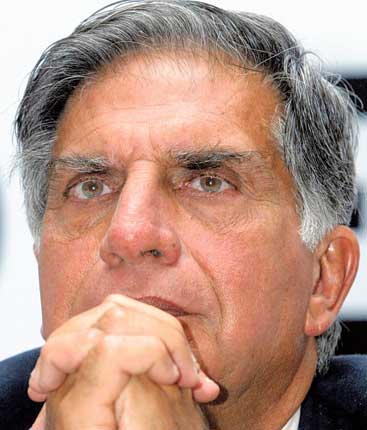Farewell to the tycoon who built a £42bn empire
Ratan Tata, The biggest name in Indian business is retiring – but will his empire stay in the family? Andrew Buncombe reports

On the Colaba seafront at the tip of Mumbai, workers are putting what appear to be the finishing touches on an elegant retirement home for India's most celebrated business tycoon. When Ratan Tata finally steps down at the end of next year from the helm of what he has turned into a global corporate empire worth £42bn, he will move into this three-storey, white-painted home – with an infinity pool and unobstructed view of the ocean.
But if there is a calm efficiency about the site of Mr Tata's six-bedroom retirement property, it is in marked contrast to the anxiety that seeps from the boardroom at Bombay House, the Raj-era headquarters of Tata Group where the hunt is on to fill a vacancy for the biggest job in Indian business – which will also lead the UK's largest manufacturing employer. The secret process, being conducted by five senior figures who have a long association with the Tata, was due to have been completed by March. But, in a state of affairs that reflects the scale of the challenge, no announcement has been made. The search for a successor to the poster child of India Inc continues.
The list of potential figures speculated about by India's business publications changes from month to month – PepsiCo chief executive Indra Nooyi, Arun Sarin, the former CEO of Vodafone, and Carlos Ghosn, of Nissan, have all been mentioned.
But one name has remained constant: Noel Tata, the chairman's half-brother and a member of Mumbai's Parsi community. Last year, Noel, who is also the son-in-law of the single largest shareholder in the group's holding company, was made the head of Tata International, an engineering subsidiary, in a move many saw as a final grooming for the top job. For the recruiters now, the question is: should they keep the job in the Tata family?
"It's an extremely difficult situation. The company bears the name of its founder," said one business insider, who has known the Tata family for many years. "It's a seminal moment for the group."
And Lord Bhattacharyya, a British engineer and member of the selection panel, hinted at the nature of its challenge. "[The appointee] has enormous shoes to fill," said the peer. "Since [Ratan] took over in the early 1990s, he has transformed Tata into what it is today. He is a brilliant entrepreneur. In regard to [the British acquisitions] Jaguar and Corus, he has saved them for the country."
The Tata business empire is huge, with almost 100 companies and 395,000 employees. It was started as a textile business by Ratan's great-grandfather, Jamsetji Tata, in 1868. Mr Tata took the helm in 1991. He has overseen a 10-fold growth and made a number of major acquisitions, including Tetley Tea.
But he is known as a quiet, reclusive figure who spurns ostentation. Asked by an interviewer about the £630m, 27-storey property built in Mumbai by Mukesh Ambani, head of Reliance Industries, he said: "It makes me wonder why someone would do that. That's what revolutions are made of." Mr Tata, who studied architecture at Cornell University, never married and his private life has always remained out of the public realm.
But this year, in an interview with CNN, he made some rare revelations, suggesting he had come close to marriage several times. "I came seriously close to getting married four times and each time it got close to there and I guess I backed off in fear or for one reason or another," he said. "In hindsight when I look at the people involved, it wasn't a bad thing."
Mr Tata has always been projected as an ethical ambassador for Indian business. When he announced plans to develop the 100,000-rupee (£1,400) Nano in 2008 as a "people's car", he claimed his inspiration had been what he saw every day on India's roads.
"There was the father driving the scooter, his young kid standing in front of him, his wife seated behind him holding a little baby," he said. "It led me to wonder whether one could conceive of a safe, affordable, all-weather form of transport for such a family." But Mr Tata has been unable to avoid entirely some of the controversies that have dogged other Indian business leaders.
This year he gave evidence to a parliamentary committee investigating a telecoms scandal worth billions of pounds. The tycoon was cleared by federal investigators. And Mr Tata has drawn ire for praising Narendra Modi, the chief minister of Gujarat, who was accused over his role in the 2002 killing of hundreds of Muslims.
On the business side, meanwhile, Mr Tata's pet project, the Nano, has yet to achieve the success he hoped for. While the company had projected sales of a million a year, a report at the end of May suggested only 110,000 of the vehicles were sold since April 2009.
Analysts believe whoever is his successor will face several tests – including the sheer size of the Tata Group's conglomerate, which poses challenges on several fronts – and will have to be able to lead in a global market.
Join our commenting forum
Join thought-provoking conversations, follow other Independent readers and see their replies
Comments
Bookmark popover
Removed from bookmarks